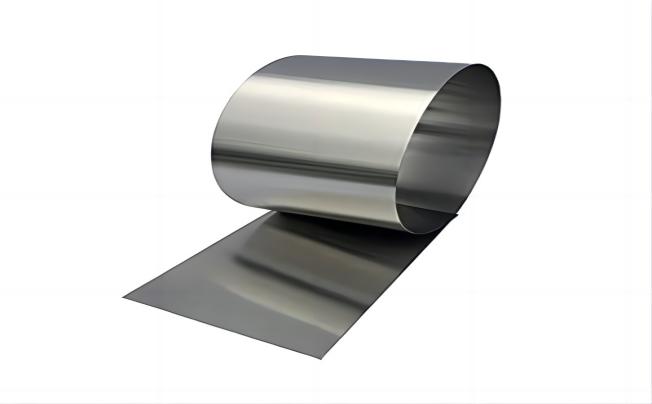What is stainless steel foil Series 400? It is a very thin stainless steel sheet that contains both the 300 and 400 series. The 400 series stainless steel foil is a class of stainless steel foil, the most popular of which is 430 stainless steel.
Product Specification and Characteristics
1. Good corrosion resistance: 400 series stainless steel foil is resistant to corrosion by most organic acids, inorganic acids, salt solutions, and moisture in ordinary atmospheric conditions. However, its corrosion resistance is slightly lower than that of the 300 series and therefore is not appropriate for use in very corrosive situations.
2. Good mechanical properties: they have high strength and hardness and can endure more mechanical stress and impact. It also has excellent cutting and shaping characteristics.
3. High-temperature resistance: They can retain stable performance over a wide temperature range, typically withstanding high temperatures of up to 800-900 degrees Celsius, and can be widely employed in high-temperature working situations.
4. Abrasion resistance: Because of their great hardness, they are resistant to abrasion and scratching to some extent, allowing them to keep a lengthy surface finish.
5. Magnetic: Because most 400 series stainless steel foils are magnetic, they are advantageous in applications requiring magnetic qualities, such as electromagnetic shielding and magnetic device fabrication.
| Item | 400 Series Stainless Steel Foil |
| Grade | 410, 420, 430, 440 |
| Thickness | 0.1mm~3mm |
| Width | Usually 1000mm,1219mm, 1250mm |
| Length | Usually 2000mm, 2438mm, 3000mm |
Applications of 400 Series Stainless Steel Foil
1. Architectural decoration: 400 series stainless steel foils have a better appearance and durability and are often used for indoor and outdoor decorating, such as walls, doors, windows, and stairwell handrails, among other things.
2. Kitchen appliances: Because of their superior corrosion resistance and ease of cleaning, they are extensively used in the manufacture of kitchen appliances such as stoves, range hoods, refrigerators, and so on.
3. Food processing: It is commonly used in the fabrication of food processing equipment, tableware, and containers because it meets food hygiene regulations, does not emit pollutants, and can withstand the corrosion of food acidic or alkaline chemicals.
4. Chemical equipment: 400 series stainless steel foil has good corrosion resistance and high-temperature resistance and is widely used in the chemical industry, oil and gas, and other areas for the fabrication of equipment such as reactors, heat exchangers, and so on.
5. Vehicle parts: Due to its intermediate hardness and strength, it is frequently used to make vehicle parts such as exhaust pipes, exhaust hood shells, and so on.
6. Electrical products: because of their magnetic qualities, they are appropriate for shielding materials and magnetic components used in the manufacture of electronic products.
Differences Between 300 Series and 400 Series
The most popular material for fasteners, fittings, tubing, and piping is 300-series stainless steel, also known as 18-8 steel. The nominal chromium and nickel content of 300-series stainless steel is 18-8 steel. These materials have high corrosion resistance on the surface, but the chromium content is reduced due to carbon deposition. At high temperatures, chromium interacts with carbon to generate chromium carbide, which is rust-resistant.
Although the 400 series stainless steel does not have carbon deposition difficulties like the 300 series and can be heat-treated, the environment of a severe chemical atmosphere will corrode, but the 300 series will not. However, the strength of 300 series stainless steel and 400 series stainless steel is the same.
Chemical composition: The 300 stainless steel series contains the highest nickel, while the 400 includes no nickel.
Corrosion resistance: Because of the increased nickel and chromium content, 300-series stainless steel typically has stronger corrosion resistance than 400-series stainless steel.
Heat treatment: Higher hardness can be obtained by heat treating 400 series stainless steels than 300 series stainless steels.
Product Competition and Demand
Market Competition: The market is extremely competitive, primarily in terms of product quality, price, delivery capacity, and after-sales service. Asia, Europe, and North America are the primary markets. Some of Asia’s major steel and stainless steel processing enterprises have massive production capacity and control the market.
The quality and performance of stainless steel foils, as well as the process stability, are critical for competitive advantage.
Furthermore, alternative materials are putting some pressure on 400 series stainless steel foils. Materials like aluminum alloy foils and plastic films, for example, have advantages in areas like lightweight and recyclability.
Market Demand: Stainless steel foil is widely used in machinery, electronics, medicine, food processing, and other industries. For example, stainless steel foil is in high demand in construction, home appliance, automotive, electronics, and other industries, and the industry’s development state and capacity utilization rate have a significant impact on demand. Second, the economic environment has a significant impact on demand, with variations in economic growth, investment, and consumption levels influencing the magnitude of demand. In contrast, the stainless steel foil market is seeing new demand opportunities due to the introduction of new materials, greater environmental regulations, and so on. Furthermore, the growth of the renewable energy industry is creating new market prospects.
Overall, the 400 series stainless steel foil market is extremely competitive, and the standards for its high purity, high strength, and high corrosion resistance are becoming increasingly stringent as the world economy and technology improve. As a result, producers must constantly enhance product quality and performance, pay attention to changes in market needs, and alter production and sales strategies flexibly to satisfy market demand.
The Gnee Steel Group is a supply chain firm that combines panel design and processing, pipes and profiles, outdoor landscaping, and overseas small product sales. It was founded in 2008 to be the most competitive supply chain group in the world; since then, we have been committed to achieving that goal with great, consistent, and creative services. The Gnee Steel Group has become the most professional steel supply chain worldwide firm in the Central Plains after many years of hard labor.


